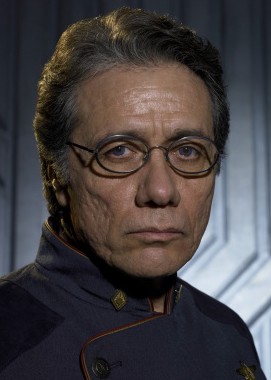I would choose science fiction in general as the apple of my eye, with Stargate, Battlestar Galactica (2003), and Star Trek being the principle triad. While dramas, documentaries, and other mediums more often than not blurt out the dreams, criticisms, and the mildly hallucinogenic aspects of humanity, leaving little room for interpretation and giving a strong urge to punch Gregory House in the gut for his own good, science fiction allows our minds to enter a realm where the truth is more subtle, our imagination runs limitless, and our general hope for human kind is iconified in Zephram Cochrane’s first jump into Warp to the sound of “Magic Carpet Ride”.
Now, I must admit, I do own a Star Trek communicator badge, every season of Stargate SG-1 and its related movies and spinoffs, and have a strong mental agreement ensuing over free will and divine providence due to Battlestar Galactica, but I have never been to any sort of scifi convention (though I would like to personally get Christopher Judge’s, Edward James Olmos’, and Brent Spiner’s autographs and personal views on their respective characters). My preferred path to geeking out is through Einsteinian thought experiments concerning the shows, reading about the technology and philosophy behind them, and watching re-runs of the shows on TV or DVD (To date I have watched each of all of the roughly 200 episodes of Stargate SG-1, 100 episodes of Stargate Atlantis, and the three current full-length movies at least three times, coming out to a 243 hour investment in my life (10 straight days), not including time spent thinking about Stargate or watching Stargate Universe, which I do not yet own on DVD.
Anyone with a rational mind and an a penchant for putting down TV addicts would hardly need to ask the question, “Why would you devote so much of your life to silly TV shows instead of reading the paper or actually working?” and any intelligent fan would hardly need to give an answer, but perhaps a quote from Isaac Asimov would work nicely, “Individual science fiction stories may seem as trivial as ever to the blinder critics and philosophers of the day, but the core of science fiction, its essence, has become crucial to our salvation, if we are to be saved at all.” This genre, apart from any other, allows the writers, directors, and actors to explore the human condition in ways that would spark controversy in other mediums. Take, for example, abortion. As the fifty-thousand survivors of the holocaust of the Twelve Colonies dwindle and die in BSG, the issue of whether abortion should be outlawed to protect population growth arrives concerning the possibility of asylum for an underage girl from Gemenon (akin to Christian Evangelicals, particularly the strict interpretation of scripture) who is pregnant and wants an abortion. President Roslin eventually makes the decision to outlaw abortion, which sparked debate within the show and would without doubt have prompted hate-rants if a similar incident happened in modern society. But since it is science fiction, we can take the event and learn from it without becoming blinded by philosophical or religious beliefs because, well, it’s just TV, not real life. While many other examples from these shows and others have profound moral implications, allowing the thoughtful viewer to take morality more objectively due to the fictional premise and setting, the simple alarm clock of inspiration stemming from science fiction has also inspired astronauts, engineers, politicians to become what they are today with the promise of a brighter future for humanity, which to many has always seemed to constantly want to swallow a hydrogen bomb and throw away the deactivation codes. Live long, and prosper.






No comments:
Post a Comment